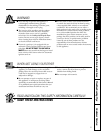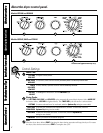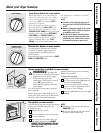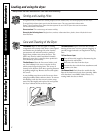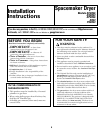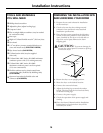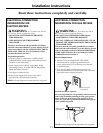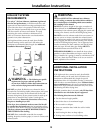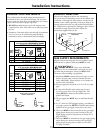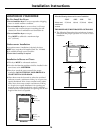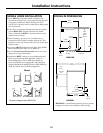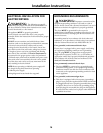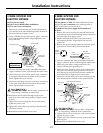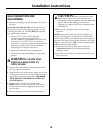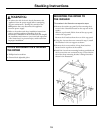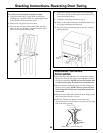
Installation Instructions
EXHAUST DUCTING LENGTH
The exhaust system should be inspected and cleaned a
minimum of every year with normal usage. The more the
dryer is used, the more often you should check the exhaust
system and vent hood for proper operation.
• DO NOT assemble the duct work with fasteners that
extend into the duct. They will serve as collection points
for lint.
• Insulation – Ductwork which runs through an unheated
area or is near an air conditioning duct should be
insulated to reduce condensation and lint buildup.
MAXIMUM LENGTH
of 4“ (10.2 cm) Dia. FLEXIBLE METAL TUBING
PREFERRED VENT HOOD TYPE
0 30’ (9.14 m) 18’ (5.49 m)
1 22’ (6.71 m) 14’ (4.27 m)
2 14’ (4.27 m) 10’ (3.05 m)
4” (10.2 cm) Louvered
4”
(10.2 cm)
Number
of 90°
turns
2.5”
(6.35
cm)
MAXIMUM LENGTH
of 4“ (10.2 cm) Dia. RIGID METAL DUCT
PREFERRED VENT HOOD TYPE
0 60’ (18.28 m) 48’ (14.63 m)
1 52’ (15.84 m) 40’ (12.19 m)
2 44’ (13.41 m) 32’ (9.75 m)
3 32’ (9.75 m) 24’ (7.31 m)
4 28’ (8.53 m) 16’ (4.87 m)
4” (10.2 cm) Louvered
4”
(10.2 cm)
Number
of 90°
turns
2.5”
(6.35
cm)
CORRECT
INCORRECT
INSTALL MALE FITTINGS IN
CORRECT DIRECTION
EXHAUST DIRECTION
All dryers are shipped set up for rear exhausting.
On electric dryers, exhausting can be on the cabinet right
or left side, or through the dryer bottom. Gas dryers can
exhaust on the cabinet right side or the dryer bottom. To
change exhaust direction you will need Exhaust Kit Pub.
No. 14-A018 and a rigid metal 4″ 90-degree elbow. The kit
is available through your GE retailer. Follow the
instructions supplied with the kit.
Same as
other side
EXHAUST DUCT LOCATING
DIMENSIONS
3 3/4″ (9.5 cm)
3 3/4″ (9.5 cm)
13 5/16″
(34 cm)
4 3/8″
(11 cm)
5 7/8″
(15 cm)
GAS SUPPLY REQUIREMENTS
Replace brass connecting pipe that is not plastic-coated.
Stainless steel or plastic-coated brass MUST be used.
WARNING: Never reuse old flexible
connectors. The use of old flexible connectors can cause
gas leaks and personal injury. Always use NEW flexible
connectors when installing a gas appliance.
1. Installation MUST conform with local codes, or in the
absence of local codes, with the National Fuel Gas
Code, ANSI Z223.1 (latest edition) or in Canada, the
current CAN/CGA B149.
2. The gas supply line should be of 1/2″ (1.27 cm) rigid
pipe.
3. If codes allow, flexible metal tubing may be used
to connect your dryer to the gas supply line. The
tubing MUST be constructed of stainless steel or
plastic-coated brass.
4. The gas supply line MUST have an individual shutoff
valve.
5. A 1/8″ (0.32 cm) NPT plugged tapping, accessible for
test gauge connection, MUST be installed immediately
upstream of the gas supply connection to the dryer.
6. The dryer MUST be disconnected from the gas supply
piping system during any pressure testing of the gas
supply piping system at test pressures in excess of 1/2
psig (3.45 kPa).
7. The dryer MUST be isolated from the gas supply piping
system during any pressure testing of the gas supply
piping system at test pressures equal to or less than
1/2 psig (3.45 kPa).
13



